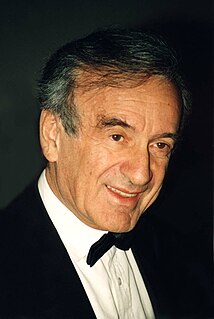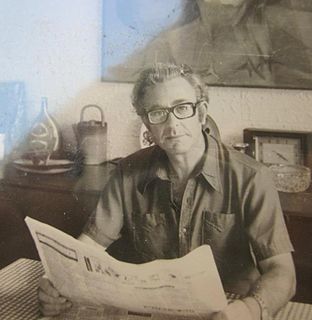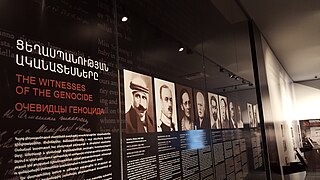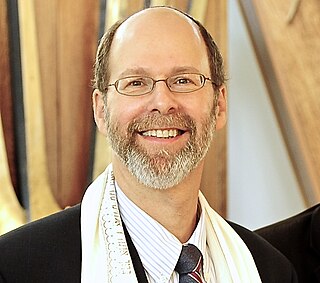Related Research Articles

Elie Wiesel was a Romanian-born American writer, professor, political activist, Nobel laureate, and Holocaust survivor. He authored 57 books, written mostly in French and English, including Night, a work based on his experiences as a Jewish prisoner in the Auschwitz and Buchenwald concentration camps.

The Holocaust Industry: Reflections on the Exploitation of Jewish Suffering is a 2000 book by Norman Finkelstein, in which the author argues that the American Jewish establishment exploits the memory of the Nazi Holocaust for political and financial gain, as well as to further the interests of Israel. According to Finkelstein, this "Holocaust industry" has corrupted Jewish culture and the authentic memory of the Holocaust.

Bernard Lewis, was a British American historian specialized in Oriental studies. He was also known as a public intellectual and political commentator. Lewis was the Cleveland E. Dodge Professor Emeritus of Near Eastern Studies at Princeton University. Lewis's expertise was in the history of Islam and the interaction between Islam and the West.

The United States Holocaust Memorial Museum (USHMM) is the United States' official memorial to the Holocaust. Adjacent to the National Mall in Washington, D.C., the USHMM provides for the documentation, study, and interpretation of Holocaust history. It is dedicated to helping leaders and citizens of the world confront hatred, prevent genocide, promote human dignity, and strengthen democracy.

The International Association of Genocide Scholars (IAGS) is an international non-partisan organization that seeks to further research and teaching about the nature, causes, and consequences of genocide, including the Holocaust, the Armenian genocide, the genocides in Cambodia, Rwanda, Burundi, Bosnia-Herzogovina, Bangladesh, Sudan, and other nations. The IAGS also advances policy studies on the prevention of genocide. The association's members consider comparative research, case studies, links between genocide and other human rights violations, predictive models for prevention of genocide, and tribunals and courts for the punishment of genocide. The organization's membership includes academics, anti-genocide activists, artists, genocide survivors, journalists, jurists, and public policy makers. Membership is open to interested persons worldwide.
Justin A. McCarthy is an American demographer, professor of history at the University of Louisville, in Louisville, Kentucky. He holds an honorary doctorate from Boğaziçi University, Turkey, and is a board member of the Institute of Turkish Studies and the Center for Eurasian Studies (AVIM). His area of expertise is the history of the late Ottoman Empire.
Leo Kuper was a South African sociologist specialising in the study of genocide.

Richard Gable Hovannisian is an Armenian American historian and professor emeritus at the University of California, Los Angeles. He is known mainly for his four-volume history of the First Republic of Armenia.

Menachem Z. Rosensaft an attorney in New York and the founding chairman of the International Network of Children of Jewish Survivors, is a leader of the Second Generation movement of children of survivors. He has been described on the front page of The New York Times as one of the most prominent of the survivors' sons and daughters. He has served as national president of the Labor Zionist Alliance, and was active in the early stages of the Israeli-Palestinian peace process. As psychologist Eva Fogelman has written: "Menachem Rosensaft's moral voice has gone beyond the responsibility he felt as a child of survivors to remember and educate. He felt the need to promote peace and a tolerant State of Israel as well. He wanted to bring to justice Nazi war criminals, to fight racism and bigotry, and to work toward the continuity of the Jewish people".
Israel W. Charny is an Israeli psychologist and genocide scholar. He is the editor of two-volume Encyclopedia of Genocide, and executive director of the Institute on the Holocaust and Genocide in Jerusalem.
Terrence Des Pres was an American writer and Holocaust scholar.
Heath Ward Lowry is the Atatürk Professor of Ottoman and Modern Turkish Studies emeritus at Princeton University and Bahçeşehir University. He is an author of books about the history of the Ottoman Empire and Modern Turkey.

Shamai Davidson was an Israeli professor, psychiatrist and psychoanalyst, who spent 30 years working with Holocaust survivors, trying to understand the nature of their experience. He was Medical Director of Shalvata Mental Health Center and served as Head of the Elie Wiesel Chair for the Study of the Psycho-Social Trauma of the Holocaust.
Holocaust studies, or sometimes Holocaust research, is a scholarly discipline that encompasses the historical research and study of the Holocaust. Institutions dedicated to Holocaust research investigate the multidisciplinary and interdisciplinary aspects of Holocaust methodology, demography, sociology, and psychology. It also covers the study of Nazi Germany, World War II, Jewish history, religion, Christian-Jewish relations, Holocaust theology, ethics, social responsibility, and genocide on a global scale. Exploring trauma, memories, and testimonies of the experiences of Holocaust survivors, human rights, international relations, Jewish life, Judaism, and Jewish identity in the post-Holocaust world are also covered in this type of research.
Harry James Cargas was an American scholar and author best known for his writing and research on the Holocaust, Jewish–Catholic relations, and American literature. He was a professor at Webster University for nearly three decades, and his circle of friends and collaborators included the American novelist Kurt Vonnegut, Nobel Laureate and Holocaust survivor Elie Wiesel and sportscaster and humanitarian Bob Costas.

Witnesses and testimony provide an important and valuable insight into the events which occurred both during and after the Armenian genocide. The Armenian genocide was prepared and carried out by the Ottoman government in 1915 as well as in the following years. As a result of the genocide, as many as 1.5 million Armenians who were living in their ancestral homeland were deported and murdered.
Armenian–Jewish relations are complex, often due to political and historical reasons.

Eli Rubenstein is a Holocaust educator, writer, and filmmaker. He is currently the religious leader of Congregation Habonim Toronto at Toronto synagogue founded by Holocaust survivors. He is also the National Director of March of the Living Canada, Director of Education for March of the Living International, Director of March of Remembrance and Hope Canada, and Chairman of the Canadian Friends of the Israel Guide Dog Center for the Blind.
Bibliography of the Armenian genocide is a list of books about the Armenian genocide:
The International Conference on the Holocaust and Genocide was the first major conference in the field of genocide studies, held in Tel Aviv on 20–24 June 1982. It was organized by Israel Charny, Elie Wiesel, Shamai Davidson and their Institute on the Holocaust and Genocide, founded in 1979. The conference's objective was to further the understanding and prevention of all genocides; it marked the shift from viewing genocide as an irrational phenomenon to one that could be studied and understood.
References
- ↑ Fascism and Democracy in the Human Mind: A Bridge Between Mind and Society, By Israel W. Charny Published by U of Nebraska Press, 2006, p. 373
- ↑ Statement of the Institute on the Holocaust and Genocide, May 2005
- ↑ Prevent genocide International, Prof. Israel W. Charny, Washington, D.C., 2000
- ↑ Around the World; Armenians to Take Part In Tel Aviv Seminar, New York Times, June 16, 1982
- ↑ Holocaust Literature: A Handbook of Critical, Historical, and Literary Writings, by Saul S. Friedman, 1993, p. 196